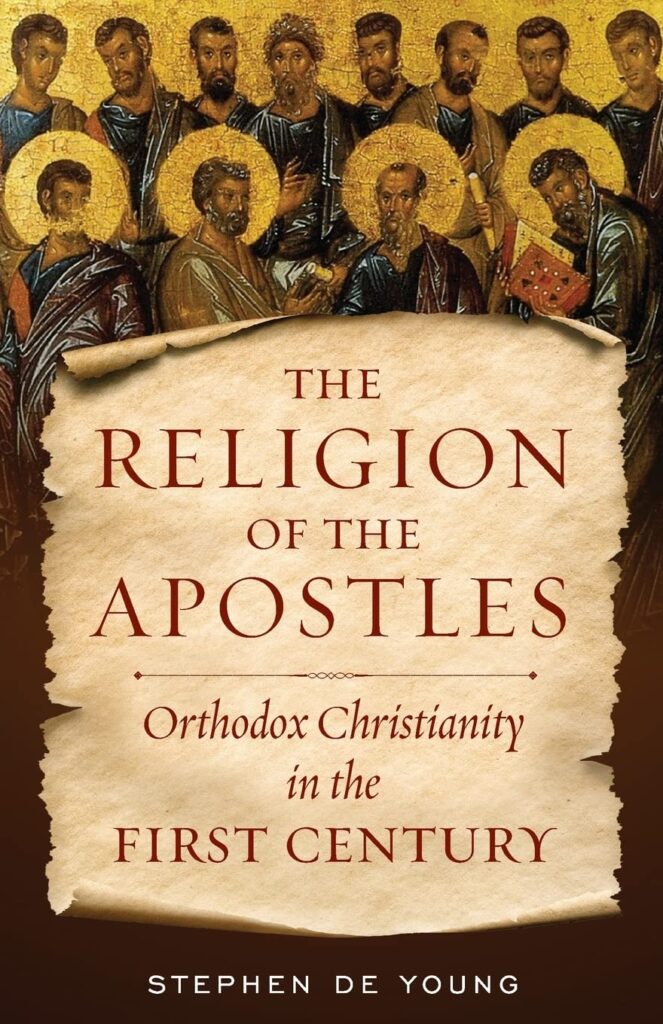If you’ve ever wondered what Christianity looked like in the days of the Apostles—or whether the early Church actually resembled any Christian tradition today—Fr. Stephen De Young’s The Religion of the Apostles: Orthodox Christianity in the First Century offers a bold and illuminating answer. This thought-provoking book dives into the beliefs, worship, and worldview of the earliest Christians and shows how their faith lines up remarkably with modern-day Eastern Orthodox Christianity.
In this detailed book review, we’ll explore the key themes, theological insights, and why this book is essential reading for anyone interested in biblical theology, Orthodox Christian roots, or early Church history.
About the Book: A Return to Apostolic Christianity
Fr. Stephen De Young is both a biblical scholar and an Orthodox priest, known for his work in connecting Second Temple Judaism with New Testament theology. In The Religion of the Apostles, he argues that the Apostles didn’t start a new religion, nor did they adopt a vague spiritual faith that gradually evolved into “organized religion.” Instead, they practiced a fully realized form of faith—what we now recognize as Orthodox Christianity.
The book aims to correct modern misunderstandings that often portray the early Church as primitive, decentralized, or doctrinally undeveloped. By drawing on Scripture, Church Fathers, and ancient Jewish texts, Fr. Stephen shows that the religion of the Apostles was sacramental, liturgical, hierarchical, and deeply mystical.
Main Themes in The Religion of the Apostles
1. The Divine Council: Understanding the Biblical Spiritual World
One of the most compelling parts of the book is its explanation of the Divine Council, a concept rooted in Old Testament literature and echoed in the New Testament. Far from a monotheistic flatland, the biblical cosmos is filled with a hierarchy of spiritual beings—angels, archangels, seraphim, and others—who operate under God’s authority.
This ancient worldview gives fresh context to many passages in the Bible, such as references to “principalities and powers” or the struggle against “spiritual forces of darkness.” According to Fr. Stephen, the Apostles believed in a cosmic spiritual battle, and this belief shaped their theology and worship.
2. Christ’s Victory Over Death, Sin, and the Powers
Rather than focusing solely on individual salvation, the early Church saw Christ’s mission as cosmic restoration. Fr. Stephen emphasizes the Christus Victor model of salvation, where Christ defeats death, demons, and corruption through His Incarnation, Crucifixion, and Resurrection.
This is not a departure from Old Testament theology but its fulfillment. Christ is the High Priest, the sacrificial Lamb, and the New Temple—all at once. These themes align directly with Orthodox Christian theology, where the focus is on union with God (theosis) and transformation, not just legal forgiveness.
3. Orthodoxy and Apostolic Worship
One of the book’s strongest arguments is that early Christian worship was liturgical, sacramental, and communal—not just an informal gathering of believers. Fr. Stephen presents evidence that the Apostles:
- Celebrated the Eucharist as a real sacrifice
- Honored saints and martyrs
- Believed in sacred space and hierarchy
- Practiced fasting, confession, and spiritual warfare
In other words, Orthodox Christian practices today mirror the Apostolic Church—not by accident, but by direct continuity.
4. Scripture and Tradition: A United Voice
Fr. Stephen also tackles the modern divide between Scripture and Tradition, a hallmark of Protestant thinking. He argues that in the first-century Church, oral Tradition and liturgical life were the context in which Scripture was written and understood. The New Testament emerged within the Church—it did not create the Church.
This view supports the Orthodox claim that the Church is the guardian of Scripture, interpreting it through the lives of the saints, the liturgy, and the ongoing experience of the Holy Spirit.
Why This Book Matters for Understanding Early Christianity
For readers looking to uncover the true religion of the Apostles, this book delivers. It’s especially important for those raised in Protestant traditions who may have heard that early Christianity was “simple” and only became complex or hierarchical centuries later. Fr. Stephen thoroughly dismantles that idea.
Instead, he paints a picture of a Church born in power, mystery, and continuity—a Church that is still visible today in Eastern Orthodoxy. Whether you’re exploring Orthodoxy for the first time or want a deeper understanding of your own faith, this book connects biblical theology with historical reality in a way few others do.

